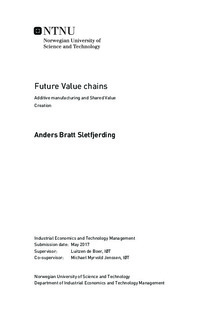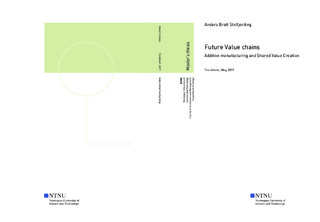| dc.description.abstract | The aim of this thesis is to explore the value chains of the future by examining use and implementation of novel technology. Environmental and social considerations will be essential in planning future value chains, thus it s crucial that innovation and technological development of products and processes reflect this. The handling of environmental and social issues in the future is examined through a framework called Shared Value Creation (SVC), that aims to tackle these challenges, while also providing opportunity for business to create financial sustainability. Additive manufacturing (AM) is chosen as the technology to be examined due to its novelty and popularity in both the private sphere and for industrial uses. Layered manufacturing technology can manufacture parts with a variety of characteristics that traditional manufacturing methods cannot achieve. However, the implementation of AM is difficult due to the variety of knowledge needed to utilize it to its full extent. To assess the implications that implementing AM may have on value chains, it is thus important to explore how an organization can best position themselves to gain the necessary knowledge. A possible solution is to utilize an organization s industrial network by interacting with actors and access external resources. A case study is performed on a company who has successfully utilized AM to improve one of their products. The company is analysed based on their participation in a development project, considering three main topics, namely additive manufacturing, interactions and shared value creation. These topics are comprised into a conceptual framework that assess how an organization can implement AM by interacting with actors in the industrial network, and what impact AM has on the value chain with regard to environmental, social and financial sustainability. The result of the research showed that interactions played a crucial part in enabling AM implementation, in that the case company coordinated resources with network actors, which resulted in creation of new knowledge related to AM. Furthermore, the outcome of the development project proved to be beneficial in a SVC perspective, which may indicate that AM can support competitiveness in future value chains. | en |

